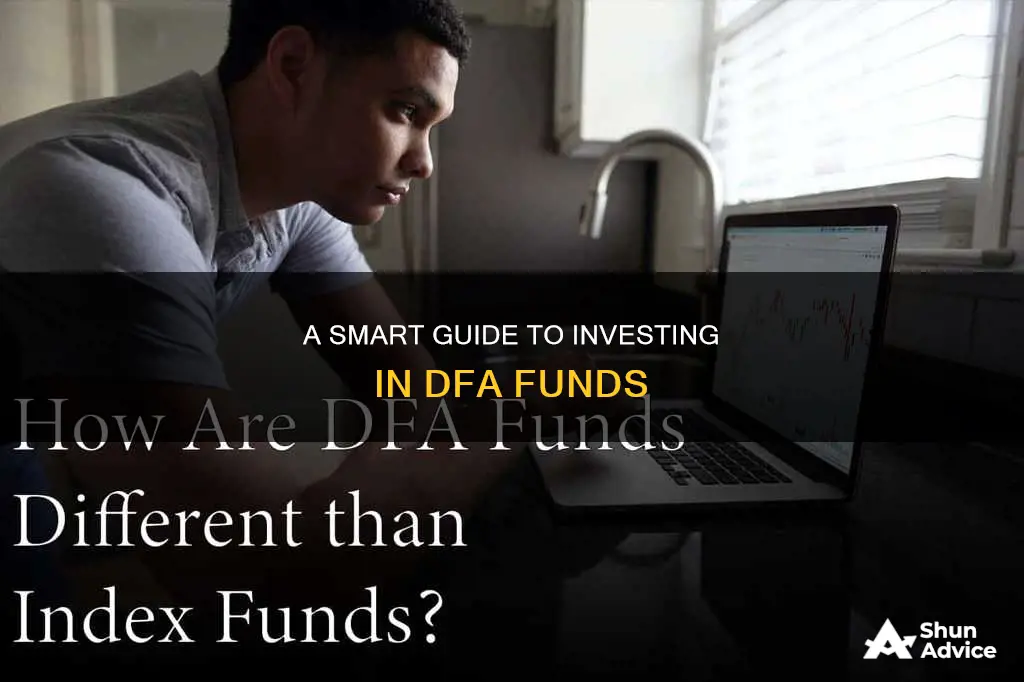
Dimensional Fund Advisors (DFA) is an investment management company that takes a unique approach to mutual fund investment strategy. DFA funds are based on dimensional attributes, such as the equity premium, size premium, value premium, and profitability premium. The company's investment philosophy is data-driven and relies on empirical evidence rather than speculation. DFA funds are not readily available to the general public and investors can only access them through select financial advisors who have undergone a rigorous selection process. This ensures that advisors managing investor accounts understand and respect DFA's philosophy of investing based on academic research. To invest in DFA funds, individuals must first select an approved financial advisor, open a brokerage account, and then build their portfolio with the help of a fiduciary-approved mutual fund advisor.
| Characteristics | Values |
|---|---|
| Investment fund type | Based on "dimensional" attributes |
| Dimensions that impact investment strategy | Equity premium, size premium, value premium, profitability premium |
| Investment management type | Mutual funds |
| Investment approach | Data-driven, no speculation, science of investing |
| Available through | Financial advisors, brokerage platforms, plan providers |
| Fees | Vary depending on the fund |
| Investment horizon | Long-term strategy |
| Diversification | Across different market segments |
| Risk management | Robust mechanism |
| Performance | Strong performance track record |
What You'll Learn

Understand DFA's unique investment philosophy
Dimensional Fund Advisors (DFA) is an investment management company that takes a unique approach to mutual fund investment strategy. DFA's investment philosophy is data-driven and based on empirical evidence from rigorous academic research in finance. This includes the efficient market hypothesis and studies on factor-based investing, such as the three-factor model developed by Eugene Fama and Kenneth French.
The key dimensions that impact DFA's investment strategy are:
- The equity premium: The belief that stocks perform better than bonds over the long term.
- The size premium: The understanding that small companies tend to outperform large companies over time.
- The value premium: The idea that value companies will outperform growth companies in the long term.
- The profitability premium: The notion that more profitable companies will deliver better returns than less profitable ones.
DFA's philosophy revolves around these carefully determined "premiums" or factors, moving away from solely relying on past performance and market trends. Instead, they consider relative price, company size, and profitability to guide their investment strategy. This approach has proven successful over several decades, attracting investors who believe that success is not arbitrary.
DFA's factor-based strategy involves targeting these premiums to guide investment decisions:
- Company Size: This refers to the historical evidence that smaller companies tend to perform better than larger ones over time. This may involve overweighting or investing in small-cap stocks compared to their market capitalization weights.
- Relative Price (Value): Stocks with lower valuation metrics, such as low price-to-earnings (P/E) or price-to-book (P/B) ratios, tend to outperform those with higher valuations.
- Profitability: Companies with stronger profitability metrics, such as return on equity (ROE) or operating margins, tend to deliver superior long-term performance.
DFA's investment strategy involves meticulously selecting securities that demonstrate these factors, aiming to capture systematic sources of risk and long-term market returns within a modern investment framework. This approach is based on the belief that attempting to time the market is challenging, and investors are better off sticking to a long-term plan.
By focusing on these underlying factors driving returns, DFA investors can potentially achieve solid returns while reducing overall risk.
Super Funds: Where Your Money is Invested
You may want to see also

Choose a DFA-approved financial advisor
DFA funds are not available to the general public, and investors can only access them through financial advisors who have been approved by the company. These advisors have undergone a rigorous and lengthy selection process to ensure they understand and respect DFA's unique philosophy of investing based on academic research and the science of investing.
Expertise and Experience:
Look for advisors who have extensive knowledge and experience in DFA investing. They should be well-versed in DFA's investment philosophy, strategies, and products. This expertise will enable them to provide sound advice and help you navigate the complexities of DFA investing.
Fiduciary Duty:
Opt for advisors who have a fiduciary duty to act in their clients' best interests. Fiduciary advisors are legally and ethically bound to prioritize their clients' financial goals and well-being above their own. This ensures that you receive unbiased and trustworthy guidance when making investment decisions.
Customized Advice:
Choose an advisor who takes the time to understand your unique financial circumstances, goals, and risk tolerance. A good advisor will tailor their recommendations to your specific needs, helping you select DFA funds that align with your investment objectives and comfort level with risk.
Fee Structure:
Be mindful of the fee structure when selecting a DFA-approved advisor. Some advisors charge a percentage of assets under management, while others may have flat fees or hourly rates. Understand the cost structure upfront to ensure it aligns with your budget and the level of service provided.
Communication and Support:
Look for an advisor who provides clear and timely communication. They should be responsive to your questions and concerns, offering guidance and support throughout your investment journey. Effective communication ensures you stay informed and involved in the decision-making process.
Reputation and Track Record:
Consider the reputation and track record of the advisor. Seek out testimonials, reviews, and referrals from their past or current clients. A reputable advisor with a proven track record of successful DFA investments can give you greater confidence in their abilities and the potential outcome of your investments.
Remember, choosing the right DFA-approved financial advisor is a crucial step in your investment journey. Take your time to research, interview, and evaluate potential advisors to find one who aligns with your needs and investment philosophy.
Mutual Funds for NRIs: Best Indian Investment Options
You may want to see also

Open a brokerage account
Opening a brokerage account is the second step in investing in DFA mutual funds. The first step is selecting an approved financial advisor.
By opening a brokerage account, investors gain access to a range of investment options, including stocks, bonds, mutual funds, exchange-traded funds (ETFs), and other securities. A brokerage account also facilitates transparency and accountability, as clients can view their portfolio holdings, track performance, and receive regular statements and reports detailing their investment activity and account balances.
Dimensional Fund Advisors (DFA) funds are available to individual investors through affiliated financial advisors and are also used by institutional investors, such as pension funds and endowments. DFA funds are not readily available to the general public and can only be accessed through select financial advisors who have undergone a rigorous and lengthy selection process.
When choosing a brokerage platform, it is important to consider the fees and costs associated with the account, as well as the range of investment options available. It is also essential to ensure that the brokerage platform is secure and compliant with regulatory requirements.
Additionally, investors should consider the level of customer support and the platform's ease of use. Some brokerage platforms offer features such as automated investing, tax-loss harvesting, and portfolio rebalancing, which can be beneficial for investors.
It is worth noting that DFA funds are no-load (commission-free) and are known for their low costs, diversification, and tax efficiency. When selecting a brokerage account, investors should ensure that the platform offers access to DFA-approved funds, as not all platforms may provide this option.
Best Vanguard Funds for Your Taxable Investment Portfolio
You may want to see also

Build a diversified portfolio
Diversifying your portfolio is a key component of DFA-style investing. By investing in a deliberately varied portfolio of stocks with high exposure to certain dimensions, you can reduce your overall portfolio risk.
When building a diversified portfolio, it's important to keep the following in mind:
- Dimension Exposure: Different DFA funds have different exposures to various market premiums. Choose funds that align with your financial goals and risk tolerance. For example, the DFA US Large Cap Value Fund (DFLVX) is designed to capture the value premium of the US large-cap market, while the DFA US Small Cap Fund (DFSTX) targets the small-cap premium.
- Fees: DFA funds come with fees that can vary depending on the fund. Compare the costs of different funds to ensure you're getting good value.
- Investment Horizon: DFA investing is a long-term strategy, so it's important to have a long-term investment horizon in mind. While short-term market fluctuations can be unpredictable, DFA's focus on changing market premiums has historically led to higher returns over time.
- Factor Investing: This subset of DFA investing focuses on stocks that exhibit certain factors, such as value, momentum, or quality, which may be associated with higher potential returns.
- Risk Premiums: Risk premiums are the returns that investors can expect for taking on specific types of risk. Small-cap stocks and value stocks, for instance, have historically offered higher returns than large-cap stocks and growth stocks, respectively. By focusing on these, you may capture higher returns over the long term.
- Customisation: DFA funds allow you to customise your portfolio based on your specific needs and goals. You can mix and match different funds to create a portfolio that aligns with your desired stock and bond ratios.
- Financial Advice: Consider seeking guidance from a financial advisor or wealth manager who understands the principles of DFA investing and can help you navigate the investment process.
Maximizing Pension Fund Investments with 80CCC Contributions
You may want to see also

Compare fees and costs
When comparing fees and costs, it is important to remember that DFA funds are not directly available to the general public and can only be accessed through select financial advisors. These advisors have undergone a rigorous selection process to ensure they understand and respect DFA's philosophy of investing based on academic research.
The fees for these advisors are typically based on service rather than account size, resulting in a fair advisor-investor relationship. While DFA does not pay commissions to approved financial advisors, investors should be aware of the costs associated with their chosen advisor.
Integrity Investment Advisors, for example, charges fees of 0.6% on the first $1 million, with declining fees after that amount. In contrast, some other DFA advisors may charge 1% or more. It is worth noting that DFA funds themselves also come with fees, and these costs can vary depending on the fund. Therefore, it is essential to compare the costs of different funds to ensure you are getting good value.
Additionally, DFA funds are available through certain employers' 401k-type plans, providing another avenue for potential investors. For example, the West Virginia Smart529 Select Plan offers investment options exclusively in DFA funds, with the program manager charging 0.42% on top of DFA's fund expense ratios.
When considering fees and costs, it is crucial to evaluate the different options available and choose an advisor and fund that align with your financial goals, risk tolerance, and investment horizon.
How Investments Increase Loanable Funds for Businesses
You may want to see also
Frequently asked questions
DFA stands for Dimensional Fund Advisor. It is an investment management company that takes a unique approach to the mutual fund investment strategy. DFA funds are based on "dimensional" attributes, such as the equity premium, size premium, value premium, and profitability premium.
DFA funds are not readily available to the general public and can only be accessed through select financial advisors who have undergone a rigorous selection process. These advisors are well-versed in selecting funds that will provide optimal results based on size, value, and profitability.
DFA funds offer lower costs and fees, strong diversification and risk management, a focus on long-term investing, and a strong performance track record. DFA's investment strategy is data-driven and relies on empirical evidence rather than speculation.
To choose the optimal DFA investments, it is essential to understand the various market factors and how their data is captured through different investment products. Some factors to consider include dimension exposure, fees, and investment horizon.
DFA does not pay commissions to approved financial advisors. Instead, fees are based on the service provided rather than account size, resulting in a fair advisor-investor relationship. It is important to compare the costs of different funds to ensure you are getting good value.







